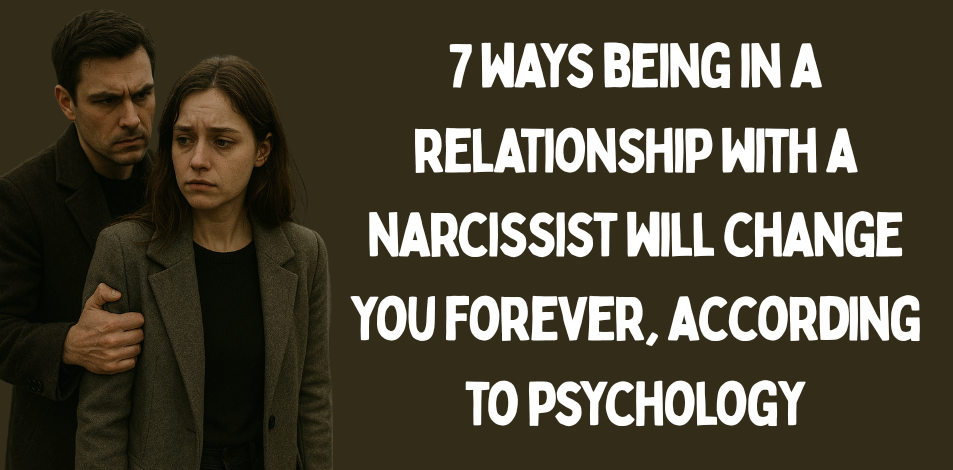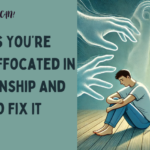
Dealing with a relationship with a narcissist is like walking a tightrope—exciting, but dangerous.
This tightrope walk can change you irrevocably, and not always for the better. I’m not just speaking from personal experience; psychology agrees.
It’s a journey that can change your self-image, your emotional health, and even your worldview. Understanding these changes is essential to healing and moving forward.
Today, I’m going to share seven ways a relationship with a narcissist can change you forever, according to psychology.
It’s not about blaming or shaming, but about understanding and growing, and hopefully, becoming a stronger person.
1) Erosion of Self-Esteem
In the labyrinth of a narcissist’s mind, it’s all about them. You may start to feel like a supporting character in your own life story.
This is no coincidence. Narcissists have a knack for undermining their partner’s self-esteem. They’re experts at spotting your vulnerabilities and exploiting them to their advantage.
Before you realize it, you may begin to question your self-worth.
The renowned psychologist Carl Rogers once said, “The strange paradox is that when I accept myself as I am, I can change.”
But in a relationship with a narcissist, self-acceptance can become an uphill battle.
Remember, it’s not about you, it’s about them. The first step toward healing is acknowledging this shift in your self-perception.
2) Loss of Personal Identity
With a narcissist, I found myself constantly adapting to their needs and desires.
My identity seemed blurred, almost dissolved. My likes, dislikes, and beliefs all began to mirror my partner.
I remember one day looking in the mirror and wondering, “Who am I really?”
This loss of personal identity is common in relationships with narcissists. You become an extension of them, and it’s easy to lose sight of your true self.
The eminent psychologist Carl Jung once said, “The honor of a lifetime is to become who you are.”
But being in a relationship with a narcissist can make the journey of self-discovery seem like an impossible task.
It’s essential to recognize this shift and work to reclaim your identity. Your identity is yours alone—don’t let anyone take it away from you.
3) Emotional Exhaustion
Have you ever felt emotionally empty? Like your emotional fuel tank was at zero?
That’s what I felt—drained, exhausted, and constantly on edge. Every interaction felt like a battlefield, every conversation a potential minefield.
Narcissists are known for their emotional demands.
RELATED:7 red flags most men overlook when they’re distracted by a woman’s beauty
They can be charming and engaging one moment, and cold and detached the next. These emotional fluctuations can leave you feeling stressed and exhausted.
Famous psychologist Abraham Maslow once said, “The ability to be present in the moment is an essential element of psychological health.”
But when you’re in a relationship with a narcissist, being present in the moment can often feel like walking on eggshells.
Recognizing this emotional exhaustion is the first step toward reclaiming your psychological health. You deserve peace, not constant turmoil.
4) Increased Vulnerability to Anxiety and Depression
Living with a narcissist can be a high-stress environment. This chronic stress can, over time, negatively impact your mental health.
In fact, one study found that people with narcissistic partners were significantly more likely to experience symptoms of depression and anxiety.
Unpredictability, constant criticism, and emotional manipulation can all contribute to increased anxiety.
You may also feel hopeless, a common symptom of depression.
Understanding this link between narcissistic relationships and mental health issues is crucial to understanding the changes you’re going through.
It’s not just “my thoughts,” and you’re not alone. Help is always available—don’t hesitate to ask for it.
5) Developing Unhealthy Coping Mechanisms
When you’re in a relationship with a narcissist, sometimes surviving means developing coping mechanisms.
For me, it was like a wall of emotional detachment—I learned to numb myself to the chaos around me.
However, these coping mechanisms aren’t always healthy or sustainable in the long run.
You may find yourself avoiding conflict at all costs, repressing your emotions, or constantly trying to please your partner at your own expense.
World-renowned psychologist Albert Bandura once said, “To succeed, one needs a sense of self-confidence.”
But when you’re constantly focused on coping and survival, building that self-confidence can be difficult.
Recognizing these unhealthy coping mechanisms is the first step toward breaking free from them. Remember that survival is important, but so is success.
6) Unexpected Resilience
Here’s something you might not expect. Being with a narcissist can make you more resilient.
Yes, you heard me right. It’s a tough learning curve, but it can provide you with strength you never knew you had.
I discovered my resilience in the face of constant adversity. This isn’t about romanticizing suffering, but rather recognizing our capacity for growth even in the most trying circumstances.
As psychologist Viktor Frankl said, “When we are unable to change a situation, we are challenged to change ourselves.”
Sometimes, this change manifests itself in resilience.
RELATED:7 subtle habits of good people who attract toxic relationships, according to psychology
It’s important to recognize this newfound strength. Not as a badge of honor, but as a testament to your ability to endure and overcome.
7) The Possibility of Personal Growth
Finally, amidst all this turmoil, lies a silver lining—the possibility of personal growth.
Being with a narcissist can push you to your limits, forcing you to confront aspects of yourself you might otherwise ignore. This process, while painful, can lead to profound self-discovery.
As psychologist Carl Rogers once said, “A good life is a process, not a state of being.”
Recognize this process and embrace the growth it can bring. After all, every experience, good or bad, shapes us in some way.
Final Thoughts
There’s no doubt that navigating a relationship with a narcissist is a challenging journey. It can leave you feeling lost, exhausted, and emotionally drained.
But remember, amidst all the chaos and turmoil, there is room for growth and resilience.
These changes—both painful and empowering—are a testament to your strength, resilience, and potential for transformation.
Every change is an opportunity to learn, grow, and evolve.
This journey is not for the faint of heart. But then again, neither is life. As we navigate the maze of our complex relationships and experiences, we shape our narrative and identity.
Remember, your past or your relationship with a narcissist doesn’t define you. Your courage to recognize these changes, heal, and reclaim your life defines you. Let’s return to ourselves, stronger and wiser than before.




